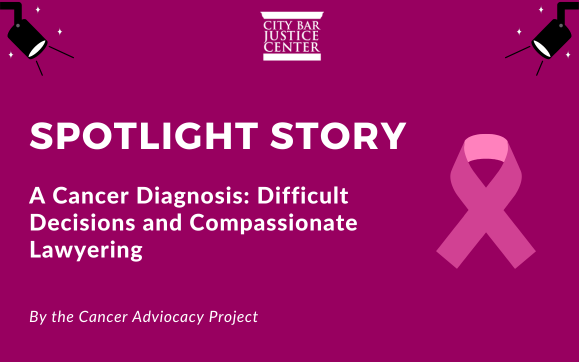Client Stories
- Youma’s Beauty
- A Cancer Diagnosis: Difficult Decisions and Compassionate Lawyering
- NYC Homeowner’s Combat Deed Theft
- Meet A Borrower in Public Service Who Got His Student Loans Forgiven
- Coqui the Chef: How a Puerto-Rican Entrepreneur Learned to Adapt and Thrive During the Pandemic
- #WiFi4Homeless: A Virtual Existence with Virtually No Internet
- #WiFi4Homeless: Online School, Off-Line in Shelter
- #WiFi4Homeless: Inaccessible Internet, Inaccessible Housing
- Homeless Need Internet Access to Find a Home: A Client Story – Part 2

A Cancer Diagnosis: Difficult Decisions and Compassionate Lawyering
A cancer diagnosis is a life-changing event that can profoundly affect many aspects of people’s lives in addition to the inevitable health-related anxieties. The impacts of diminished income, job insecurity, and battles with health insurance and medical debt can ripple outwards, causing additional strain for families and requiring holistic, compassionate problem-solving. The City Bar Justice Center’s Cancer Advocacy Project (CAP) is a key resource for cancer patients and survivors, as well as their caregivers, providing free legal assistance to cancer-affected residents of New York City with limited financial resources. Specifically, CAP assists with preparing essential life-planning documents, advises on cancer-related rights and protections in the workplace, and challenges unjust coverage denials by private health insurers.
CAP clients have medical and legal needs that may coalesce in a crisis – something we recently saw in the case of Sarah (pseudonym) who faced some critical decisions after being diagnosed with cancer.
Sarah has a close relationship with her two adult children, Robin and John, and her minor child, Jamie (all pseudonyms). All live together in her subsidized cooperative apartment, and they are a close, mutually supportive family. Following her divorce from Jamie’s biological father, who is mostly absent from Jamie’s life, Sarah and her children had confronted and overcome serious challenges to date. Then came the cancer diagnosis. At that time, Robin had just begun the probationary period at a new job, allowing him to envision a promising future, and John had recently prevailed over his own period of adversity and was working on stabilizing his life. Sarah’s overriding goal on contacting CAP was to protect the stability and security of her children, particularly her youngest child.
CAP assigned Sarah’s case to a team of volunteers from Latham & Watkins LLP – Kevin Fingeret, Maeve Chandler, Saem Kim, and Dori Rahbar – who worked closely with Sarah to provide the time and space she needed to think deeply about her wishes and to express the outcomes she was hoping for. There were numerous consequential decisions to be made, such as which of her adult children was best positioned to serve as Jamie’s guardian, who to appoint as primary and successor agent(s) to handle her medical and financial wishes, and how to secure her children’s rights to remain in their home. The team identified and researched each issue as it arose and helped Sarah to work through various options until she felt comfortable with her choices.
When Sarah’s health suddenly worsened and she was hospitalized, her legal team worked quickly to finalize necessary documents and helped her execute the documents at the hospital before Sarah moved to hospice care. Her legal team followed up afterwards with Sarah to share detailed explanation on each of the documents that were executed, as well as any advice on potential next steps and recommendations for legal services organizations that may be able to further help her children as they navigate their next steps as the situation evolves, which is especially important for Jamie’s guardianship, the children’s succession to the co-op apartment and for settling Sarah’s estate. This allowed Sarah to shift her focus to spending precious time with her family knowing that her wishes have been well documented.
Sarah’s legal team reflected on what the experience meant to them: “Our team met [Sarah] in such a vulnerable time in her life, and yet she was so consistently kind, welcoming, patient, and generous throughout the process—even during the most difficult moments, such as determining who will be a standby guardian for her minor child. It was inspiring to see her calm and steady focus to protect her family, and how she came to every meeting prepared with answers to the most difficult questions about her end-of-life wishes, even when she felt physically weak from active treatment. It was a privilege to meet and work with her. We are grateful that we were able to help [Sarah] navigate various decisions and formalize her final wishes into legal documentation.”














